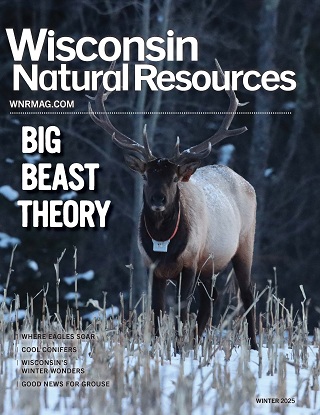Outdoors for everyone
Black Men Northwoods Retreat forges adventure and new experiences
Story and photos by James Edward Mills
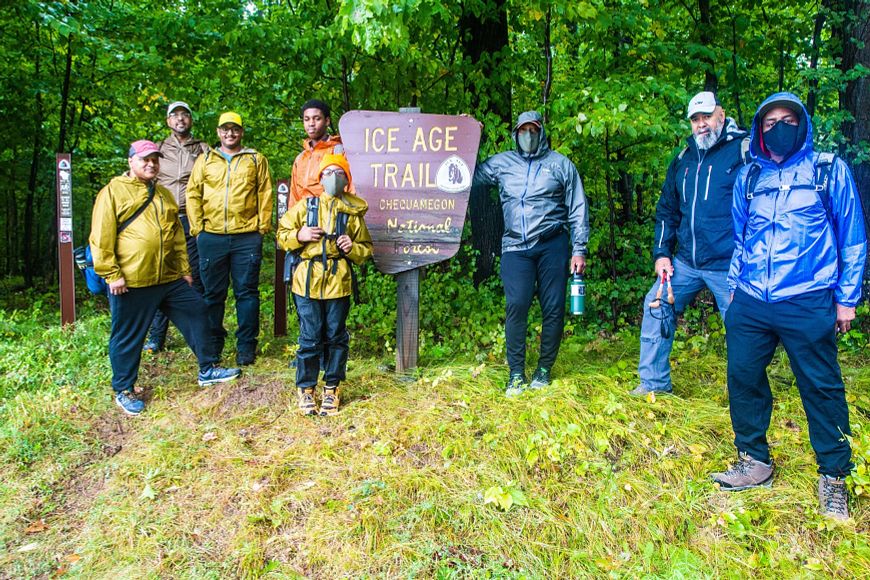 Damp conditions don't deter the Black Men Northwoods Retreat group, from left to right: Joseph Roy, Norman Davis, Selwyn Skinner-Roy, Malachi Davis, Cornell Davidson, Aaron Perry, Christopher Kilgour and Daryl Davidson.
Damp conditions don't deter the Black Men Northwoods Retreat group, from left to right: Joseph Roy, Norman Davis, Selwyn Skinner-Roy, Malachi Davis, Cornell Davidson, Aaron Perry, Christopher Kilgour and Daryl Davidson.Immediately after breakfast, our little group sat discussing what would happen next.
A steady rain had been falling since late the night before, and the prospects of the hike we had planned appeared grim. Holding up my iPad, I showed everyone an image of the local weather radar map.
“As you can see, there’s a bit of a window opening up,” I said, pointing to a clear spot in a mass of swirling colors ranging from yellow/orange to deep red. “If we start now, we should be OK for a little while, but I’m pretty sure eventually we’re going to get wet.”
An uncertain silence settled over everyone as we each quietly weighed our options. Finally, the youngest member of the crew shared his thoughts.
“I think we should just go,” said 12-year-old Cornell Davidson. “That’s why we’re here.”
The National Forest Foundation asked me to develop a storytelling project on issues of diversity, equity and inclusion on our public lands as part of the “It’s All Yours” campaign, launched in 2015 with the U.S. Forest Service. Of course, I jumped at the opportunity.
But travel restrictions of the COVID-19 pandemic added more than a few logistical challenges to a project that was already going to be a bit complicated. Air transportation to a remote national forest location near the Rocky Mountains in Colorado or the Cascade Range of the Pacific Northwest would have been difficult at best.
The natural alternative was simply to stay close to home. Though I have traveled throughout much of the wooded backcountry of northern Wisconsin, I had never before made a concerted effort to explore the vast area around the Chequamegon-Nicolet National Forest, just a few hours’ drive from where I live in Madison.
And what better way to see this amazing wilderness than to walk along the Ice Age National Scenic Trail?
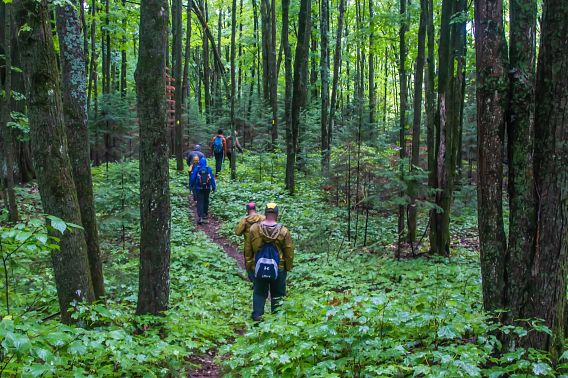 COVID-19 pandemic travel restrictions made the Ice Age National Scenic Trail through the Chequamegon-Nicolet National Forest the perfect venue for the project.
COVID-19 pandemic travel restrictions made the Ice Age National Scenic Trail through the Chequamegon-Nicolet National Forest the perfect venue for the project.PLANNING DURING A PANDEMIC
As it turned out, the biggest obstacle to the successful completion of this project was how to assemble a group of enthusiastic participants.
My goal was to introduce both the forest and the trail to a community of people we seldom see enjoying these beautiful tracts of public land. Nationally, Black Americans represent 13.1% of the United States’ population, but among visitors to national parks and forests, our numbers include only between 2% and 7% of recreational users across the country.
In a state like Wisconsin, whose residents are mostly white, rates of participation in activities like camping and hiking within communities of color are lower still.
This begged the question: How could I possibly create an authentic and worthwhile experience for this underrepresented group of people who may have never ventured into the outdoors before?
Ironically, the global pandemic seemed to have created a unique opportunity to do just that.
For more than eight months, people of color have been disproportionately impacted by infections of the novel coronavirus. Nationally, Black people make up a little more than 13% of the population but had accounted for nearly 20% of U.S. deaths from the virus through November.
“It’s as if this disease is stalking us,” said Aaron Perry, founder of the Rebalanced Life Wellness Association, based in Madison. “Black people need to find a way to escape.”
SAFETY AND WELLNESS
This horrible disease has put into sharp relief the deep disparities of health and wellness within the Black community. Many of the same medical conditions that disproportionately impact people of color, like heart disease, diabetes, hypertension and obesity, leave this population vulnerable to a variety of different ailments, including the coronavirus.
A new study published in the International Journal of Environmental Health Research reveals that even a short time spent in the outdoors can reduce emotional stress, lower heart rates and blood pressure and provide a sense of physical well-being.
I believe that if precautions can be taken to minimize exposure to the virus, through limited public engagement, physical distancing, the wearing of face masks and persistent hand sanitizing, it is possible to create a safe and healthy environment where a group of conscientious individuals can enjoy a restful retreat into the natural world.
At the Rebalanced Life Wellness Association, Perry specializes in efforts to improve the health outcomes of Black men in southern Wisconsin. He provides basic monitoring and education services to encourage positive lifestyle choices including a healthy diet and regular physical exercise.
Having taken part in his community programs to introduce local men of color to recreational running and cycling, I figured he would be the perfect person with whom to partner to create a hiking trip for Black men.
“You need to know though,” he told me, “not many of them would be interested in camping.”
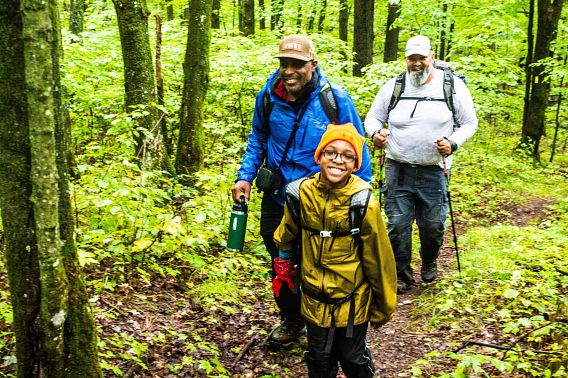 Enthusiasm runs high for 12-year-old Cornell Davidson, his father, Daryl Davidson, and Christopher Kilgour, right.
Enthusiasm runs high for 12-year-old Cornell Davidson, his father, Daryl Davidson, and Christopher Kilgour, right.FATHERS, SONS, FRIENDS
With the support of a small grant from the National Forest Foundation and the Schlecht Family Foundation, we were able to provide lodging, food and transportation for nine participants for our adventure in mid-September. We stayed at a modest motel in Rib Lake, which happens to lie directly in the path of the Ice Age Trail on the edge of the Chequamegon-Nicolet National Forest.
The group consisted of three fathers and their sons, plus Perry and my friend Christopher Kilgour, an educator at UW-Madison and a lifelong outdoors enthusiast. Everyone had a private room, with fathers and sons together, and no contact with the motel staff.
Kilgour and I prepared meals for everyone in a large, well-ventilated kitchen. And in a central meeting area, we were able to provide the group with basic skills training in hiking safely through the woods.
The idea was to give these men and their sons an opportunity to experience the outdoors in ways they might not have been able to before.
“I remember my maternal grandfather was a Boy Scout leader in the 1930s and ’40s at a time when scouting wasn’t for us,” said Darryl Davidson, a public health professional from Milwaukee. “He used to have to get the books and materials from the library or church groups and not let the other leaders know he was Black.”
Today, Davidson’s son Cornell is a Boy Scout working toward a merit badge in hiking. Our little outing through the Northwoods gave this young man the chance to make some progress on his goal during the pandemic, when limited travel and home confinement has made getting outside difficult.
Despite the rain, he was perhaps more excited than any of us to start walking.
MUCH-NEEDED RESPITE
A little before 11 a.m., we boarded our passenger van and drove about 10 miles to a trailhead just off a county road near a farm field. Though the rain continued to fall, a thick canopy of trees overhead offered a good amount of protection that made for a very pleasant walk.
At a steady pace, we hiked along the trail, watching for the flash of yellow markers every 50 feet or so. The path was more than a little muddy and sodden in some spots that threatened to suck our shoes right off our feet.
On our 8-mile round trip, there were stream crossings here and there. But for the most part, the way was flat and easy. It was a good time for everyone, especially as many of us had been cooped up indoors or putting in long hours of work during the pandemic.
“I’ve got young kids at home, and I’m on the job 12 hours a day, six days a week,” said Selwyn Skinner-Roy, an automobile mechanic. “It’s been a great trip. I really, really needed this.”
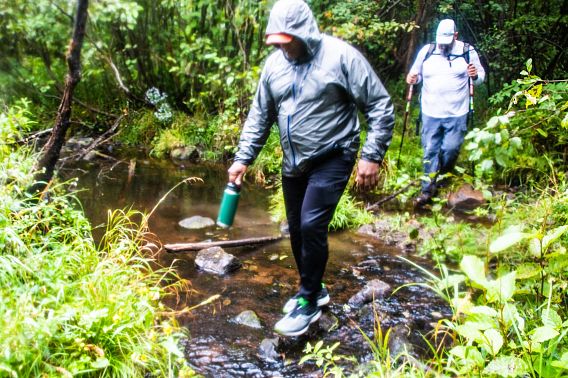 The retreat was meant to provide an escape from the COVID-19 pandemic and to reveal the healing power of nature for those members of the community who need it most.
The retreat was meant to provide an escape from the COVID-19 pandemic and to reveal the healing power of nature for those members of the community who need it most.BREAKING DOWN BARRIERS
The main purpose of our experience in the woods was to demonstrate how accessible the forest can be.
When I give a public talk, I am often asked: “What can we do to encourage more people of color to experience the outdoors?” The exact answer to that question certainly varies from one community to the next.
But in general, by removing many of the barriers to access for our trip, we were able to create a pleasant, safe, stress-free environment that gave each participant the opportunity to relax and truly enjoy themselves.
With the support of knowledgeable leaders and just a little bit of guidance, it is possible to show the people we most want to reach that they can create similar experiences for themselves — and perhaps in the future bring their family and friends with them.
“I never really knew the menu of things to do,” said Norman Davis. “Now that I have a better idea, I’d like to try something like this again.”
At its core, the Black Men Northwoods Retreat was meant to give all those involved a much-needed escape from the ever-present stresses of the COVID-19 pandemic. But it also was our intention to reveal the healing power of the natural environment for those members of our community who need it most.
From their time spent in the Chequamegon-Nicolet National Forest, I hope they and others with relatively limited access to nature will find solace and comfort in the green spaces all around them. I also hope those interested in creating similar opportunities will realize that by making these experiences fun, safe and socially relevant to the people they aim to serve, we can effectively work to shrink the divide between those who spend time in nature for recreation and those who don’t.
It’s possible each participant will come away from events like this eager to discover the natural areas not too far from their homes. And with a little luck, they may one day even become environmental advocates who work to protect the public lands they have come to love.
James Edward Mills of Madison is a freelance journalist who created the digital community The Joy Trip Project: Story Sharing for a Sustainable World. He also is author of “The Adventure Gap: Changing the Face of the Outdoors.”
INFORMATION
Several partners provided support for the Black Men Northwoods Retreat including the National Forest Foundation, Schlecht Family Foundation, Ice Age Trail Alliance and the Wisconsin Department of Natural Resources. James Yach, DNR secretary’s director for northern Wisconsin, and staff based at the Rhinelander Service Center helped with logistics.
The retreat was arranged as part of the “It’s All Yours” campaign, launched in 2015 by the National Forest Foundation and U.S. Forest Service. The initiative aims to build awareness about outdoor opportunities on National Forests and Grasslands and encourage responsible recreation and stewardship. Learn more at nationalforests.org/our-forests/its-all-yours. The Joy Trip Project digital community shares stories of outdoor recreation, conservation and sustainable living. To read and share stories, listen to podcasts and follow on social media, check joytripproject.com [EXIT DNR].

